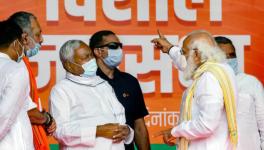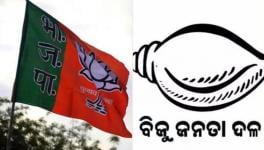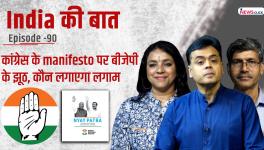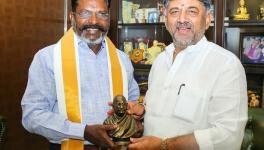BJP Sweeps Hindi Heartland
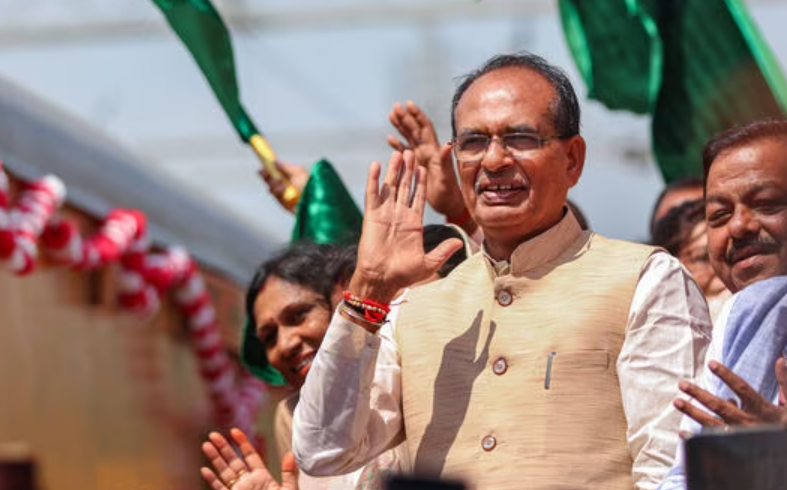
Image credit: PTI
The BJP has swept the Hindi heartland, winning the Assembly elections in Madhya Pradesh, Rajasthan and Chhattisgarh, and snatching victory literally from the jaws of defeat. The Congress party had expressed confidence at cruising to an easy victory in Madhya Pradesh and Chhattisgarh, while Rajasthan was expected to be a close fight. But it was, obviously, not to be.
These semifinals will prove a tremendous setback for the INDIA alliance, apart from the Congress party, which has been out-manouvered by its arch rival, the Bharatiya Janata Party (BJP). It is time to soberly reflect on the possibility that riding on this success, the BJP will feel free to turn the electoral and policy tide as it pleases—the Lok Sabha election could be held sooner than expected, a range of policy proposals related to Hindutva could be hot on the anvil, and much more.
For now, the South of the Vindhyas have a BJP-mukt India, while the North has a Congress-mukt Bharat (except Himachal Pradesh). The key question before the Congress now is how alliances in the future will shape up, paving the way for the BJP in the South (such as through the Janata Dal Secular). It also has to manage the perception battle—and the spread of Hindutva-fuelled fear and hatred across the Hindi belt.
For Madhya Pradesh Chief Minister Shivraj Singh Chouhan, winning a fourth time is a sweet victory, given he was not projected as next chief minister and his name was in the third list of candidates drawn up by the BJP.
The Congress is finding these losses difficult to swallow given there was no anti-incumbency against Rajasthan Chief Minister Ashok Gehlot or Chhattisgarh Chief Minister Bhupesh Baghel. Travelling across Rajasthan, the average person unanimously praised Gehlot for his “good work”.
The problem was the anger against many sitting MLAs, 86 of whom re-contested despite this. The results from 2003 to 2018 confirms that MLAs who are not seen to perform seldom get re-elected.
The Congress leader and face of the Madhya Pradesh campaign, Kamal Nath, also did not introduce new faces. Nath himself is seen to have little administrative experience at the state level. And his proximity to the Gandhi family made him a target during the Madhya Pradesh campaign.
Nath’s ‘soft Hindutva’ card has also not paid off. But the primary problem was the Congress party’s failure to develop a new narrative and merely emphasised 18-year incumbency against Chauhan. It was not enough to bring in new voters.
Nath did provide financial assistance to several Congress candidates, but the party’s struggles to raise funds was a key obstacle when matched against the cash-rich BJP. After all, some time ago, the BJP’s internal assessments had predicted a bleak future for the party in Madhya Pradesh and Chhattisgarh.
What, then, explains the turnaround (Congress has a 40.3% vote share as of now and the BJP nearly 49%)? For one, the Congress itself failed to sustain its initial lead because it lacks organisational muscle in rural and urban Madhya Pradesh.
Further, this time, the BJP has made inroads into the Adivasi regions in Madhya Pradesh and beyond, also riding on the Centre’s promises, such as a new mission for vulnerable tribal groups, promising Rs 25,000 crore for electricity, housing, education and other benefits, announced by Prime Minister Narendra Modi in Jharkhand on November 15, two days before the second round of voting in Chhattisgarh.
In Chhattisgarh, whoever wins the 20 seats in Bastar is said to win the state. But this time, the votes were divided between the Congress and the BJP, indicating the Congress losing its grip in the belt.
In hindsight, Baghel could not run with the hare and hunt with the hound. He did not implement the Panchayat (Extension to Scheduled Areas) Act seriously, and lost the goodwill of his tribal supporters.
Bhagel’s social welfare schemes had worked well, and he has a connection with the farmers, but the BJP’s direct benefit transfers and hikes in paddy procurement prices and discounted cooking gas cylinders at Rs 500 for low-income families, besides the solid campaign against liquor prohibition, have worked in its favour.
Baghel tried to counter the paddy price hike with his own promise to procure at Rs 3,200 per quintal, aside from 200 units of electricity, 17.5 lakh houses for the rural poor and Rs 6,000 per bag for tendu leaves, a Griha Laxmi scheme with an annual cash subsidy of Rs 15,000, and so on. But the BJP made its own pledge (Rs 12,000 per year for every poor married woman), which appealed to the growing numbers of women voter.
In Madhya Pradesh, for example, Chouhan has carefully nurtured female voters with targeted schemes like the Ladli Behna Yojana. Introduced for 1.2 crore women six months before the election, the promise of hikes in the payment (to Rs 3,000) seems to have tipped the scales in favour of the BJP. The six per cent vote swing for the BJP in this election is also attributed to this scheme.
The BJP has also been in an overdrive to win over the tribal votes in both Madhya Pradesh and Rajasthan. The renaming of a railway station in Indore after Tantrya Bhil, a tribal icon of the Bhil community and of providing financial assistance to widows and older people in the tribal districts has proved beneficial.
In Rajasthan, the BJP capitalised on news of starvation and malnourishment in tribal-dominated areas and the sniping between Gehlot and Sachin Pilot, who restricted his campaign around the Tonk region, but where he has built a rapport with the youth.
Since 1993, Rajasthan has replaced the incumbent party’s government with its rival in every successive Assembly election. It did not deviate from this template. Gehlot may have hoped his health insurance and urban employment guarantee scheme, other than reviving the Old Pension Scheme for government employees, would ensure re-election. Perhaps the schemes were introduced too late and appeared like mere promises.
Indeed, the Prime Minister and Home Minister constantly accused the Congress party of appeasing the minorities, particularly Muslims. In every rally, BJP leaders and their associates from the RSS or VHP, constantly referred to the coming inauguration of the Ram temple in Ayodhya. In practically every rally in Madhya Pradesh and Chhattisgarh, the public was promised government-sponsored visits to Ayodhya while the Madhya Pradesh government already has a Chief Minister Teerth Darshan Yojana.
Kamal Nath’s loss of crucial seats bordering Uttar Pradesh, in the Chambal and Gwalior belt, has cost him dearly. Akhilesh Yadav, Samajwadi Party leader’s allegation that Kamal Nath had refused to enter into a seat-sharing with him with Nath’s fatuous retort, “Arey bhai, chhoro Akhilesh-Vakilesh”, has demonstrated the pitfalls of hyper-ambition in an era of political accommodation, especially crucial for the Opposition. Ultimately the Congress found other parties ready and willing to eat into its vote share.
Gehlot also did not enter into an electoral alliance with the CPI(M) and Hanuman Beniwal’s Rashtriya Lokantrik Party, but the latter split the Jat vote. Even the Gujjar votes were split, adding to the BJP’s kitty.
Has the BJP’s strategy of parachuting three union ministers and four members of Parliament paid off? Gajendra Singh Shekhawat, Minister of Jal Shakti, has been camping in Rajasthan for several weeks, as have Minister of Agriculture Narendra Singh Tomar and Ashwini Vaishnav, Minister of Electronics and IT. Could they build momentum and energise the local cadre? It seems evident they could.
But most of all these elections highlight the gains and pitfalls of the perception battle. While Rajasthani youth turned against the Gehlot government due to numerous paper leak scandals, the frequent paper leaks and recruitment scams in Madhya Pradesh do not seem to have affected the fortunes of Chouhan.
No doubt, for Congress to hope to score in the cow belt, it needs younger and more dynamic leaders who connect to the public. It needs more backward class and Dalit leaders, too, but it’s anybody’s guess whether the few months before the Lok Sabha elections is enough opportunity.
The author is an independent writer. The views are personal.
Get the latest reports & analysis with people's perspective on Protests, movements & deep analytical videos, discussions of the current affairs in your Telegram app. Subscribe to NewsClick's Telegram channel & get Real-Time updates on stories, as they get published on our website.









